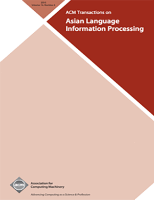
ACM Transactions on Asian and Low-Resource Language Information Processing
Scope & Guideline
Innovating solutions for linguistic diversity in computing.
Introduction
Aims and Scopes
- Natural Language Processing for Low-Resource Languages:
The journal emphasizes research that develops NLP techniques specifically tailored for low-resource languages, addressing challenges such as limited data availability and the need for effective language models. - Machine Learning and Deep Learning Applications:
A significant focus is placed on the application of machine learning and deep learning methodologies to various tasks in language processing, including sentiment analysis, named entity recognition, and machine translation. - Cross-Lingual and Multilingual Processing:
The journal explores cross-lingual approaches that facilitate understanding and processing across multiple languages, particularly in low-resource settings, fostering collaboration between languages. - Cultural and Contextual Considerations:
Research often incorporates cultural and contextual factors into language processing, recognizing the importance of these elements in developing effective NLP applications. - Innovative Data Collection and Annotation Techniques:
There is a focus on novel methods for data collection and annotation, crucial for building robust datasets for low-resource languages, ensuring that research outputs are grounded in real-world applications.
Trending and Emerging
- Emotion and Sentiment Analysis:
There is a significant upsurge in research dedicated to emotion and sentiment analysis, particularly in social media contexts. This trend reflects a growing interest in understanding human emotions through language processing, especially in low-resource languages. - Multimodal Processing Techniques:
Emerging studies are increasingly integrating multimodal approaches that combine text with other data types, such as images and audio, to enhance understanding and processing capabilities. - Transformers and Contextualized Language Models:
The adoption of transformer-based models and contextualized embeddings is on the rise, demonstrating their effectiveness in various NLP tasks for low-resource languages, leading to improved performance across multiple applications. - Social Media and Informal Language Processing:
Research focusing on processing informal language from social media platforms is gaining prominence, addressing the unique challenges posed by slang, code-switching, and other informal linguistic phenomena. - Data Augmentation Strategies:
Innovative data augmentation techniques are becoming increasingly important, allowing researchers to enhance the quality and quantity of training data for low-resource languages, thereby improving model performance.
Declining or Waning
- Traditional Linguistic Approaches:
There has been a noticeable decrease in the focus on traditional linguistic methods as researchers increasingly gravitate towards data-driven, machine learning approaches. This shift indicates a preference for empirical methods over theoretical frameworks. - Rule-Based Natural Language Processing:
Research centered around rule-based systems is diminishing as deep learning and neural network models gain favor, showcasing a movement towards more flexible and scalable solutions for language processing tasks. - Generic Language Models:
The prevalence of generic language models that do not account for the unique characteristics of low-resource languages is waning. There is a noticeable trend towards developing models specifically tailored to the nuances of individual languages.
Similar Journals

COMPUTATIONAL LINGUISTICS
Exploring the Nexus of Language and TechnologyCOMPUTATIONAL LINGUISTICS is a premier academic journal published by MIT Press, focusing on the intersection of linguistics and artificial intelligence. With the ISSN 0891-2017 and the E-ISSN 1530-9312, the journal serves as a key resource for researchers and practitioners in computational linguistics, a field that plays a crucial role in advancing language processing technologies. Since adopting an Open Access model in 2017, the journal has broadened its accessibility, encouraging a global exchange of ideas and research findings. It consistently ranks within the top quartiles of its respective fields, achieving Q1 status in Artificial Intelligence, Computer Science Applications, and Linguistics and Language as of 2023. This notable standing is further reflected in its Scopus rankings, placing it in the 99th percentile for Language and Linguistics, and maintaining a prestigious position in various computer science categories. The journal publishes cutting-edge research, theoretical frameworks, and practical applications, and aims to foster interdisciplinary collaboration among linguists, computer scientists, and AI specialists. As the field evolves, COMPUTATIONAL LINGUISTICS remains an essential platform for disseminating transformative ideas and pioneering work that shapes the future of language and technology.

International Arab Journal of Information Technology
Catalyzing Ideas for the Next Generation of TechnologyWelcome to the International Arab Journal of Information Technology, a prestigious publication under the aegis of ZARKA PRIVATE UNIVERSITY in Jordan, dedicated to advancing the field of Information Technology. First established in 2008, this journal has made significant strides in disseminating high-quality research, achieving an impressive Q2 ranking in Computer Science (miscellaneous) and securing a notable 57th percentile position in the Scopus rankings. With a comprehensive scope encompassing various sub-disciplines of computer science, the journal is committed to promoting scholarly dialogue and innovation among researchers, professionals, and students. While currently operating as a subscription-only journal, it remains a vital resource for the academic community seeking to explore the latest trends and advancements in technology. The International Arab Journal of Information Technology is not only a platform for original research but also a vibrant hub for ideas that shape the technological landscape of the Arab region and beyond.
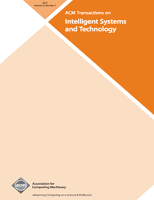
ACM Transactions on Intelligent Systems and Technology
Pioneering Insights at the Intersection of Technology and IntelligenceACM Transactions on Intelligent Systems and Technology, published by the Association for Computing Machinery (ACM), is a leading peer-reviewed journal dedicated to the rapid dissemination of innovative research in the fields of Artificial Intelligence and Theoretical Computer Science. With an impressive Impact Factor and a strong H-Index, it boasts a premier standing in the academic community, being ranked Q1 in both AI and Theoretical Computer Science categories as of 2023. This journal serves as a critical platform for researchers, professionals, and students aiming to contribute to and stay informed about the latest developments in intelligent systems and technology. While there are currently no open-access options, readers can explore invaluable insights into current trends and methodologies from 2010 to 2024, making it an essential resource for anyone passionate about advancing their knowledge in these rapidly evolving domains. The journal continues to foster collaboration and innovation, reflecting the forefront of research where technology intersects with intelligent systems.
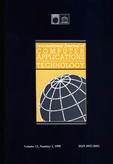
INTERNATIONAL JOURNAL OF COMPUTER APPLICATIONS IN TECHNOLOGY
Unlocking the potential of computer applications across diverse domains.International Journal of Computer Applications in Technology is a reputable academic journal published by InderScience Enterprises Ltd, dedicated to advancing the field of computer applications across various domains including Computer Networks and Communications, Computer Science Applications, and more. With an ISSN of 0952-8091 and an E-ISSN of 1741-5047, this journal has been a credible source of research since its inception in 1976, transitioning into its current form in 1988. With its consistent rank in the Q3 quartile for several key engineering and computer science categories in 2023, it highlights the significance of the journal and its contributions to ongoing discourse in these fields. Researchers benefit from its wide-ranging scope, which encompasses both theoretical and practical applications of technology, making it an invaluable resource for both industry professionals and academic scholars. Although it currently does not provide open access, the journal remains committed to disseminating high-quality research that is essential for technological advancement and innovation.
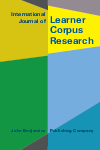
International Journal of Learner Corpus Research
Navigating the Future of Language Acquisition ResearchThe International Journal of Learner Corpus Research (ISSN: 2215-1478, E-ISSN: 2215-1486), published by JOHN BENJAMINS PUBLISHING CO, stands at the forefront of research in the fields of education and linguistics, with a notable impact demonstrated by its Category Quartile rankings of Q2 in Education and Q1 in Linguistics and Language for 2023. This distinguished journal, based in the Netherlands, presents cutting-edge studies that focus on learner corpus research—an area that merges linguistic analysis with practical applications in language learning and teaching. Spanning an impressive convergence period from 2015 to 2024, it has established itself as a vital resource for researchers, educators, and students eager to explore the nuances of language acquisition through empirical data. Notably, its high Scopus rankings underscore its significance within the academic community, making it a must-read for those dedicated to advancing the understanding of learner language dynamics.

International Journal of Semantic Computing
Unveiling the Future of Computational LinguisticsThe International Journal of Semantic Computing is a premier scholarly publication focused on the intersection of artificial intelligence, computer networks, and linguistics, published by World Scientific Publishing Co PTE Ltd. Since its inception in 2007, this journal has strived to advance the field of semantic computing by promoting innovative research and interdisciplinary collaboration among professionals and academics. With a diverse scope that spans across various categories including Artificial Intelligence, Information Systems, and Linguistics, it boasts commendable rankings, particularly in the fields of Linguistics (77th Percentile) and Linguistics and Language (Rank #259/1167). The journal caters to a broad audience by offering critical insights and cutting-edge studies, thereby contributing significantly to knowledge enhancement in semantic technologies and computational linguistics. Although it does not offer open access options, its rigorous peer-review process ensures the publication of high-quality research that is invaluable for both researchers and students seeking to deepen their understanding in these rapidly evolving areas.
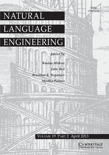
Natural Language Engineering
Advancing the Frontiers of Language and TechnologyNatural Language Engineering is a premier journal published by Cambridge University Press, dedicated to advancing the field of artificial intelligence and its intersection with linguistics and software. Since its inaugural publication in 1995, the journal has established itself as a vital platform for innovative research and development in natural language processing (NLP) and engineering. With a notable impact factor reflecting its influential contributions, it ranks in the top tiers across various categories, including Q1 in Linguistics and Language and Q3 in Artificial Intelligence. Researchers and practitioners alike benefit from the opportunity to access insightful articles that address both theoretical aspects and practical applications of NLP technologies. Although it operates under a traditional subscription model, the rigorous peer-review process ensures high-quality publications that foster academic discourse and collaboration within the community. This journal is essential for anyone interested in the evolving landscape of language engineering, making it a cornerstone reference for upcoming scholars and seasoned professionals aiming to push the boundaries of knowledge in this dynamic field.

International Journal on Document Analysis and Recognition
Empowering Knowledge through Document InsightsInternational Journal on Document Analysis and Recognition (IJDAR), published by Springer Heidelberg, stands at the forefront of research and advancements in the field of document analysis, computer vision, and pattern recognition. With its ISSN 1433-2833 and E-ISSN 1433-2825, the journal is an essential resource for researchers and practitioners focusing on innovations in automatic document processing, image analysis, and artificial intelligence applications in document retrieval and recognition. Recognized as a Q1 journal in multiple relevant categories, including Computer Science Applications, Computer Vision and Pattern Recognition, and Software, IJDAR boasts impressive Scopus rankings that position it among the top-tier publications in these domains. The journal’s converged publication years from 1998 to 2024 offer a rich repository of knowledge essential for both theoretical and practical advancements, ensuring that researchers, professionals, and students can keep pace with the latest findings and methodologies. Access options may vary, but the journal continuously strives to facilitate the dissemination of high-quality research that contributes significantly to the academic discourse in document analysis and recognition.

PROCESAMIENTO DEL LENGUAJE NATURAL
Bridging Disciplines: Where Language Meets TechnologyPROCESAMIENTO DEL LENGUAJE NATURAL, published by the SOCIEDAD ESPAÑOLA DE PROCESAMIENTO DEL LENGUAJE NATURAL (SEPLN), is a premier journal that serves as a vital resource in the interdisciplinary fields of Computer Science and Linguistics. With an impressive 2023 impact factor ranking it as Q2 in Computer Science Applications and Q1 in Linguistics and Language, this journal offers valuable insights into the latest advancements and research trends. Based in Spain, and associated with the University of Alicante, the journal provides a platform for the dissemination of high-quality research, contributing significantly to the understanding of natural language processing and its applications. Although it operates under a traditional subscription model, the accessibility and relevance of its content make it an essential read for researchers, professionals, and students keen on exploring the intersection of language and technology. The journal’s performance, reflected in its Scopus ranks that place it in the top percentiles across various categories, reaffirms its importance in academia and its commitment to fostering innovation and knowledge in the field.

MACHINE TRANSLATION
Empowering global dialogue through machine translation.MACHINE TRANSLATION, published by Springer, is a premier academic journal dedicated to the interdisciplinary fields of Artificial Intelligence, Linguistics, and Software Development. With its origins dating back to 1989, the journal has played a crucial role in disseminating cutting-edge research and advancements in machine translation technologies. The journal holds a distinguished Q3 ranking in Artificial Intelligence and Q1 in Linguistics and Language for 2023, underlining its relevance and impact in the linguistic and computational research communities. Despite coverage discontinuation in Scopus, it continues to have impressive rank positions in various categories, including 31st percentile for Language and Linguistics and 112th for Artificial Intelligence. Researchers, professionals, and students can access a wealth of impactful articles that explore the latest methodologies, tools, and applications in the domain of machine translation, solidifying its importance for anyone vested in the future of language technology.